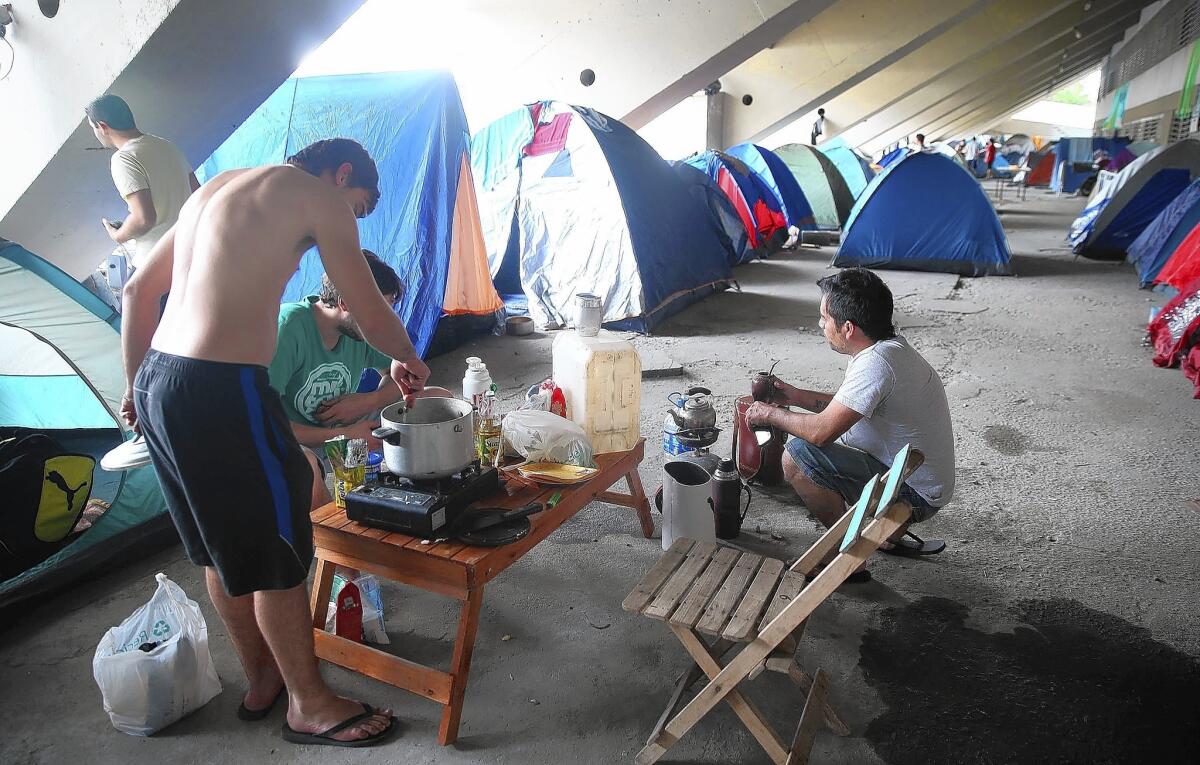Cash-short Argentines flood Rio in hope of basking in World Cup glory

- Share via
Reporting from Rio de Janeiro — Tens of thousands of Argentines, most without game tickets and unable to find or afford hotel rooms, have descended on Rio de Janeiro for Sunday’s World Cup final pitting their nation’s blue-and-white-clad soccer heroes against Germany.
At the Sambadrome, home to Rio’s annual samba school parades during Carnaval, hundreds of Argentine soccer fans milled around Saturday morning in a parking lot colony, sipping yerba mate to keep warm after spending the night outdoors.
Elsewhere across the city, makeshift settlements of tents and camper vans have cropped up, many of whose occupants drove or took two-day bus trips to neighboring Brazil after their nation’s team beat the Netherlands in a penalty shootout Wednesday to earn their spot in the final match.
“Since we’ve made it so far in the tournament, the community of Argentines here has grown and grown,” said Patricio Orfus, 30, of Buenos Aires, who took a 42-hour bus trip with a friend to be here during the final match. “I had to come.”
With tickets going for anywhere from about $850 on the official FIFA website to an average of $3,000 on the resale market for one of the 75,000 or so seats in Maracana Stadium, many of those in attendance will be privileged Brazilian and international soccer enthusiasts, along with insiders of FIFA, soccer’s global governing body.
City officials estimate that more than 100,000 Argentines will arrive before the match to bask in the glory. Argentina is close enough that young or working-class Argentines can make the trip without needing to pay for a flight. Because Argentina has not won a World Cup since 1986, many decided to make the pilgrimage and rough it.
“Argentines are everywhere,” read the cover of Saturday’s Extra newspaper. “The Sambadrome seems to be a hotel for thousands of them.”
Though Argentina and Brazil have economies of about the same size, per capita, Argentina’s weaker currency makes Brazil more expensive for Argentines than it is for many other tourists.
Some have been forced to hunt for bargains wherever they can.
“The conversion rate between the [Brazilian] real and our peso does not do us any favors,” said Orfus, who has slept in tents on the patios of homes and stocked up at the supermarket to avoid restaurants.
”Here our money just isn’t worth what it is at home,” said Juan Manuel Garcilazo, 21. “We’re just eating street food, whatever we can afford.”
Though friendly politically and culturally, Argentina and Brazil are fierce rivals in soccer. When Argentina took on the Netherlands in the semifinals in Sao Paulo, some Brazilians and Argentines in attendance spent the game trading jeers about their respective countries, largely ignoring the Dutch.
But the taunting back and forth was minor, mostly over such issues such as whether Pele or Maradona is the greatest soccer player ever.
After Brazil’s devastating 7-1 loss to Germany in last week’s other semifinal, media here have aired coverage of the lengths their visiting cash-strapped neighbors have gone to get by, as if to assert some kind of superiority to balance the horrifying vision of Argentina raising the World Cup on Brazilian soil.
Garcilazo and Juan Pablo Espindola, 20, drove for three days from Argentina’s Entre Rios province with three other men packed into the car. When they arrived in Rio on Friday night, they slept in the car, sitting upright. They decided they would try to pitch a tent on the beach Saturday night.
“If we were traveling in Argentina, we’d rent a place. But we can’t afford it here,” Espindola said during half-time for the Brazil-Netherlands third-place match. “But we don’t care. We have the beach. And soon we’ll have the Cup.”
Bevins is a special correspondent
More to Read
Sign up for Essential California
The most important California stories and recommendations in your inbox every morning.
You may occasionally receive promotional content from the Los Angeles Times.













